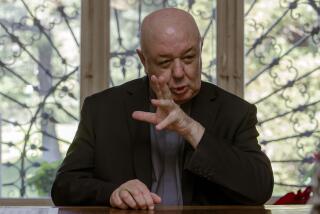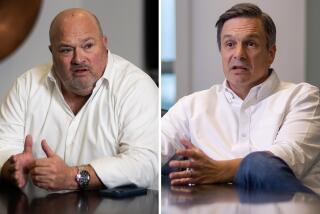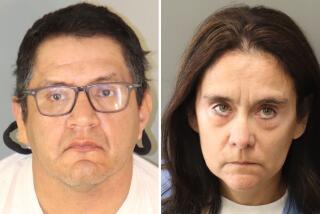Church knew for years L.A. bishop had been accused of abuse
The Archdiocese of Los Angeles knew for at least 13 years that one of its bishops had been accused of sexual abuse at a parish but did not inform the public until this week, despite repeated vows to disclose such information.
The archdiocese, which over the years has paid out a record $740 million in settlements to victims of priest abuse, had promised to publicize the names of clergy accused of wrongdoing. But Bishop Alexander Salazar’s name was not on several lists released by the church, even though he’d been investigated by the Pasadena Police Department in 2002. The inquiry involving Salazar only became public when Pope Francis accepted his resignation Wednesday as auxiliary bishop of Los Angeles.
Neither Salazar nor his attorney could be reached for comment.
The archdiocese said the departure of Salazar, who has long maintained his innocence, was an important step in its effort to better respond to abuse allegations that have roiled the church. But it raises questions about why it took so long for the Vatican to act and for the public to be told about Salazar’s history.
According to prosecutors and police, Salazar was accused of committing a lewd act with a child in the 1990s. The archdiocese said the allegations were made by a family who attended the Assumption of the Blessed Virgin Mary church in Pasadena, where Salazar served as a pastor from 1988 to 1992. The family didn’t go to police until 2002, during the height of the priest abuse scandal. Detectives investigated and submitted their findings to the Los Angeles County district attorney’s office, which decided not to file charges.
In 2004, Pope John Paul II elevated Salazar to the position of bishop. The archdiocese said its officials were not informed about the Pasadena investigation until 2005. But Pasadena police on Wednesday indicated at least some in the church might have known sooner. The department said the incident involving Salazar was said to have occurred at a private residence. But officials made “contact with the church and the school, in an abundance of caution, as they employed the individual against whom the complaint was made,” the department said in a statement to The Times.
Once senior officials learned of the allegations, the archdiocese referred the matter to the Vatican’s Congregation for the Doctrine of the Faith, which investigates clergy sexual misconduct, Archbishop Jose H. Gomez said in a letter to the parishioners Wednesday.
The congregation “imposed certain precautionary measures” on Salazar, who remained a bishop.
Asked why the church did not name Salazar among the hundreds of clergy accused of misconduct, spokeswoman Adrian M. Alarcon said that the bishop was overseen by the pope and that it wasn’t the archdiocese’s place to make the disclosure.
“As this matter involves a bishop, it is overseen by the Holy See,” Alarcon said.
Some advocates for survivors of priest abuse expressed outrage that Salazar’s alleged conduct was not made public much sooner.
“This is an egregious violation of their policy of transparency. It demonstrates there never was a zero-tolerance policy for abusers in the Los Angeles Archdiocese,” said Joelle Casteix, a leader of Survivors Taking on Predators. “He was elevated to bishop after his abuse was reported to police.”
Salazar’s resignation comes amid growing pressure on the Vatican to deal with a new series of priest scandals.
An Illinois attorney general’s report released Wednesday found that the number of Catholic clergy accused of sexual abuse in the state was much higher than previously acknowledged. The report found 690 clergy accused, although church officials had publicly identified only 185 with credible allegations against them. This summer, a grand jury report out of Pennsylvania uncovered a decades-long cover-up of child sex abuse involving more than 1,000 victims and hundreds of priests, sparking outrage and calls for reform.
In response, the Los Angeles diocese and others across California and the nation have released new lists of clergy accused of wrongdoing.
“We owe it to the victim-survivors to be fully transparent in listing the names of those who perpetrate this abuse,” Gomez said in a statement last month in releasing a list with 54 additional names. Salazar was not among them.
Exactly how the bishop came to resign is unclear.
But Gomez said in his statement Wednesday that he sought and received permission from the Vatican to submit the allegation against Salazar to the Los Angeles Archdiocese’s independent clergy misconduct oversight board.
“The board found the allegation to be credible and I submitted its findings and recommendations along with my own votum to the Holy See to make its final determination as to Bishop Salazar’s status,” Gomez wrote.
Gomez said the resignation shows a “deep concern for the healing and reconciliation of abuse victims and for the good of the church’s mission.”
Salazar, 69, was born in San Jose, Costa Rica, and grew up in Los Angeles. He attended Daniel Murphy High School, East Los Angeles College and Cal State L.A. before eventually attending St. John’s Seminary.
He was ordained in 1985 and worked in parishes in Whittier, Pasadena and Los Angeles before rising to become a vice chancellor of the archdiocese. In September 2004, Pope John Paul II named him an auxiliary bishop, leading the pastoral region of San Pedro, one of L.A.’s five pastoral regions.
Casteix said she was skeptical that no one in the archdiocese knew of the 2002 police investigation before Salazar was appointed a bishop.
Patrick Wall, a former ordained priest who works as an advocate for sex abuse victims in civil litigation and is a canon law expert, said he’s surprised that the church did not release Salazar’s name much earlier and that he was not included in the more than 23,000 pages of documents the archdiocese has been forced to disclose as part of its financial settlements with victims.
Wall said Salazar’s resignation may be part of a larger preparation for a summit called at the Vatican in February to discuss the sexual abuse crisis.
“Pope Francis is trying to clean house,” he said.
In July, Francis ousted Francis McCarrick, the retired archbishop of Washington, from the College of Cardinals after he was accused of molesting a minor in the 1970s. A former Vatican nuncio to the U.S., Carlo Maria Vigano, then accused the Pope of ignoring McCarrick’s behavior for years.
Special correspondent Tom Kington in Rome and the Chicago Tribune contributed to this report.
Twitter: @lacrimes
More to Read
Start your day right
Sign up for Essential California for news, features and recommendations from the L.A. Times and beyond in your inbox six days a week.
You may occasionally receive promotional content from the Los Angeles Times.







